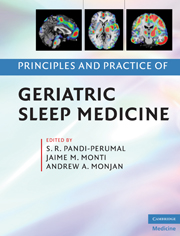Book contents
- Principles and Practice of Geriatric Sleep Medicine
- Principles and Practice of Geriatric Sleep Medicine
- Copyright page
- Dedication
- Contents
- Contributors
- Foreword
- Preface
- Credits and acknowledgments
- Organization of the first edition
- About the editors
- Part 1 Sleep and normal aging
- Part 2 Neuroendocrine and homeostatic changes in the elderly
- Part 3 Sleepdisorders in the elderly
- Part 4 Treatment of sleep disorders in the elderly
- 31 Geriatric psychopharmacology: an overview
- 32 Epidemiology of sleep medication use in the elderly
- 33 Management of insomnia in the elderly: the efficacy and safety of non-benzodiazepine hypnotics
- 34 Use of benzodiazepines in the aging population: do the benefits outweigh the risks?
- 35 Use of psychotropic drugs in the elderly: effects on sleep architecture
- 36 Non-pharmacological treatment of insomnia in the elderly: cognitive behavioral therapies
- 37 Self-help treatments for older adults with primary and co-morbid insomnia
- 38 Complementary and alternative medicine for sleep disturbances in the elderly
- 39 Therapeutic benefits of napping in the elderly
- 40 Effects oflight on the elderly
- 41 Neuroimaging of sleep in the elderly
- Index
38 - Complementary and alternative medicine for sleep disturbances in the elderly
from Part 4 - Treatment of sleep disorders in the elderly
Published online by Cambridge University Press: 04 August 2010
- Principles and Practice of Geriatric Sleep Medicine
- Principles and Practice of Geriatric Sleep Medicine
- Copyright page
- Dedication
- Contents
- Contributors
- Foreword
- Preface
- Credits and acknowledgments
- Organization of the first edition
- About the editors
- Part 1 Sleep and normal aging
- Part 2 Neuroendocrine and homeostatic changes in the elderly
- Part 3 Sleepdisorders in the elderly
- Part 4 Treatment of sleep disorders in the elderly
- 31 Geriatric psychopharmacology: an overview
- 32 Epidemiology of sleep medication use in the elderly
- 33 Management of insomnia in the elderly: the efficacy and safety of non-benzodiazepine hypnotics
- 34 Use of benzodiazepines in the aging population: do the benefits outweigh the risks?
- 35 Use of psychotropic drugs in the elderly: effects on sleep architecture
- 36 Non-pharmacological treatment of insomnia in the elderly: cognitive behavioral therapies
- 37 Self-help treatments for older adults with primary and co-morbid insomnia
- 38 Complementary and alternative medicine for sleep disturbances in the elderly
- 39 Therapeutic benefits of napping in the elderly
- 40 Effects oflight on the elderly
- 41 Neuroimaging of sleep in the elderly
- Index
Summary
Keywords
- Type
- Chapter
- Information
- Principles and Practice of Geriatric Sleep Medicine , pp. 403 - 412Publisher: Cambridge University PressPrint publication year: 2009



